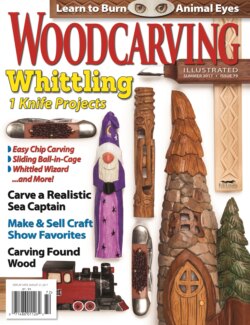Читать книгу Woodcarving Illustrated Issue 78 Spring 2017 - Группа авторов - Страница 19
На сайте Литреса книга снята с продажи.
Оглавлениеwww.woodcarvingillustrated.com
17
Make stop cuts around
the door and windows.
Use
the detail knife. Carve up to the
stop cuts to make the doors and
windows protrude. Add wood
grain texture to the door with
a small V-tool. Draw a roof line.
You can draw stones or carve
them freehand. Make stop cuts
with the detail knife around the
wall stones. Carve to the stop
cut from both sides to form a
V-shaped cut. Make the stones
random in size and shape with
no right angles and few straight
lines. Texture the stones with
a
5/16
"
(8mm) #5 gouge. Use
the V-tool to carve a thatched
texture on the roof.
4
Make stop cuts from the center
hole diagonally to the corner of each
window.
Use a hobby knife or a detail
knife. Remove the wood between the
stop cuts to make roughly rectangular
windowpanes. Use the same knife to refine
the window and undercut them to add
depth and texture.
Note:
for more on this
technique, see “Whimsical Bark House” by
Rick Jensen (
Woodcarving Illustrated
Spring
2013, Issue 62).
3
Hollow the back of the knee.
Use a coarse bit in a rotary tool. Use the
drilled holes as guides and leave the
windows
" (6mm) thick (see Tip). Plan
a shelf that allows the flame of the tea
light to be level with the window or door
to be illuminated.
2
Remove the skin from the cypress
knee.
Start about 1" (2.5cm) up from the
bottom and use a
3/8
" (10mm) #3 gouge
to remove the brown skin. Refer to the
photos and draw a door and window(s).
Drill a
1/8
" (3mm)-diameter hole in each
windowpane and in the door’s window.
1
DEPTH GUIDES
To keep from removing too much wood behind
the door and windows, sand down two pieces of
1/8
" (3mm)-thick dowel until they fit loosely in the
window holes. Color them with a red marker and
apply tape
" (1.3cm) from the end of one dowel
and
" (6mm) from the end of the other dowel.
Insert them from the front using the
" (1.3cm)-
long guide first. When the end of that dowel is
exposed in the cavity, switch to the
" (6mm)-
long guide.
TIP
CYPRESS KNEE: MAKING THE FAIRY HOUSE
